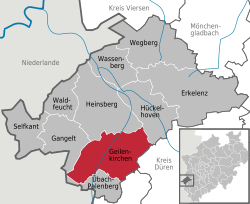Geilenkirchen
| Geilenkirchen | ||
|---|---|---|
| ||
 Geilenkirchen Location of Geilenkirchen within Heinsberg district  | ||
| Coordinates: 50°57′55″N 6°07′10″E / 50.96528°N 6.11944°ECoordinates: 50°57′55″N 6°07′10″E / 50.96528°N 6.11944°E | ||
| Country | Germany | |
| State | North Rhine-Westphalia | |
| Admin. region | Köln | |
| District | Heinsberg | |
| Government | ||
| • Mayor | Georg Schmitz[1] (Ind.) | |
| Area | ||
| • Total | 83 km2 (32 sq mi) | |
| Elevation | 95 m (312 ft) | |
| Population (2016-12-31)[2] | ||
| • Total | 26,991 | |
| • Density | 330/km2 (840/sq mi) | |
| Time zone | CET/CEST (UTC+1/+2) | |
| Postal codes | 52511 | |
| Dialling codes | 02451; 02453; 02462 | |
| Vehicle registration | HS, ERK, GK | |
| Website | www.geilenkirchen.de | |
Geilenkirchen (German pronunciation: [ˈɡaɪlənkɪʁçən]) is a town in the district Heinsberg, in North Rhine-Westphalia, Germany. It is situated near the border with the Netherlands, on the river Wurm, approx. 15 km north-east of Heerlen and 20 km north of Aachen.
It was the site of Operation Clipper in November 1944.
The town gives its name to nearby NATO Air Base Geilenkirchen. The base is home to 17 E-3A airborne early warning and control aircraft manned by crews from 14 nations.
Born in Geilenkirchen
- Ludolf Camphausen (1803-1890), banker, Prussian minister president in the revolutionary year 1848
- Otto von Camphausen (1812-1896), Prussian Finance Minister
- Christoph Dohmen (born 1957), professor of the Old Testament at the University of Regensburg
- Hans Meyer (1900-1962), German physician and ministerial official
- Max Wilms (1867-1918), German physician and surgeon
References
- ↑ Geilenkirchen | Rathaus | Beschäftigte von A-Z | Bürgermeister
- ↑ "Amtliche Bevölkerungszahlen" (in German). Landesbetrieb Information und Technik NRW. Retrieved 2018-02-24.
This article is issued from
Wikipedia.
The text is licensed under Creative Commons - Attribution - Sharealike.
Additional terms may apply for the media files.
